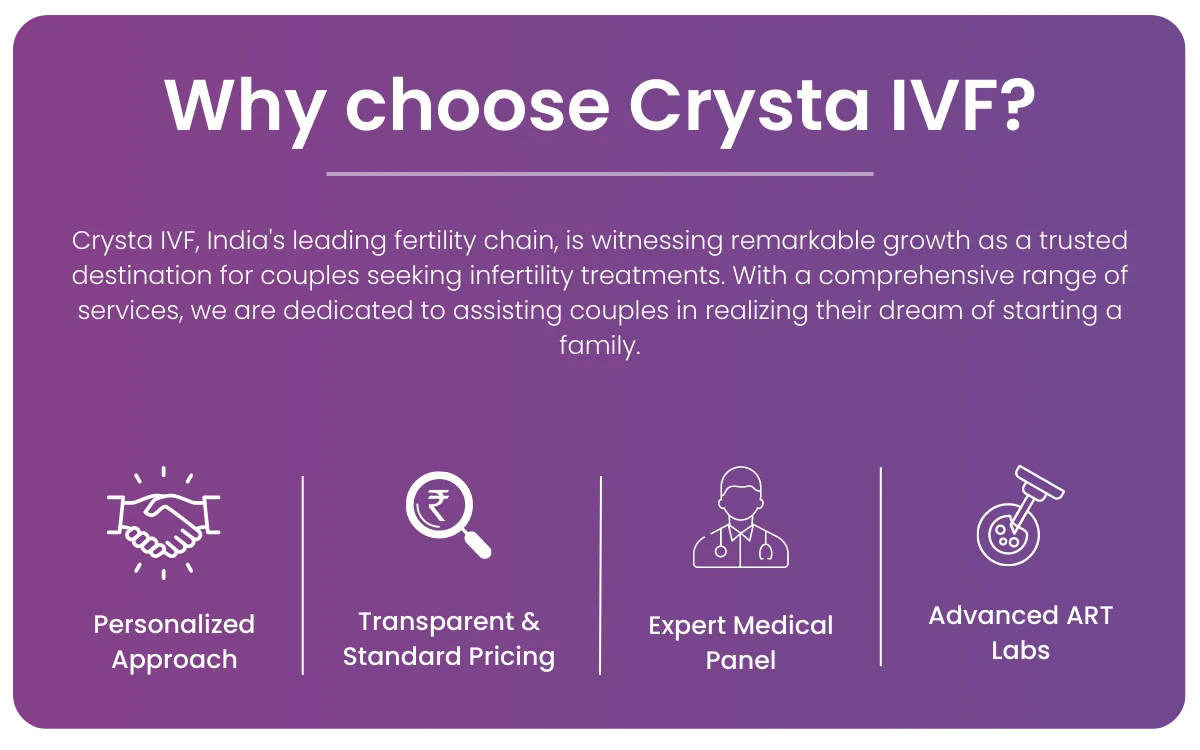The male reproductive system is intricate, involving organs and hormones vital to a man’s well-being. On the other hand, abnormalities such as testicular atrophy, in which the testicles shrink, can seriously affect both general health and fertility. Making knowledgeable decisions about this condition’s treatment is crucial, as it requires investigating its causes, symptoms, diagnosis, and available options.
Understand your reproductive at https://crystaivf.com/blogs/female-male-reproductive-system/
Several factors can contribute to testicular atrophy
- Hormonal Imbalances: Proper testicular function depends on a delicate hormonal balance. This balance can be upset by diseases like Klinefelter syndrome or problems with the pituitary gland, which can lower testosterone levels, shrink testicles, and impair fertility.
- Infections: If left untreated, bacterial or viral infections like chlamydia, HIV, and mumps can spread to testicular tissue, causing damage and shrinking testicular size. These infections may significantly impact both general testicular health and fertility.
- Testicular Torsion: In this excruciating illness, the spermatic cord twists, severing the testicles’ blood supply. Tissue damage brought on by this reduced blood flow may result in shrinkage. Seeking medical attention right away is essential to avoiding long-term harm.
- Varicoceles: These are twisted veins in the scrotum that cause blood flow problems, impair sperm development, and worsen testicular atrophy. Maintaining testicular health requires prompt evaluation and treatment.
- Exposure to Toxins: Extended exposure to environmental contaminants like heavy metals and pesticides can cause hormonal imbalances and harm to the function of the testicles, which can result in atrophy and problems with fertility.
- Chronic Medical Conditions: By producing hormonal imbalances or inflammatory processes that may impair testicular function and size, certain chronic illnesses such as cirrhosis, kidney failure, and Crohn’s disease indirectly affect testicular health.

Symptoms and Signs of Testicular Atrophy
The body speaks in subtle whispers, and recognizing the signs of testicular atrophy is crucial for early intervention:
- Breast Enlargement (Gynecomastia): Men may develop breast tissue abnormally, a condition known as gynecomastia, due to hormonal imbalances brought on by testicular atrophy. Male enlarged breast development may be a sign of hormonal imbalances and underlying testicular health problems that require medical attention and treatment.
- Softer, Sagging Scrotum- Testicular atrophy often accompanies a loss of firmness and fullness in the scrotum. This change in testicular tone manifests as a softer and more lax scrotal sac, which can be an additional physical marker indicating possible testicular health complications necessitating medical evaluation.
- Decreased Libido and Erectile Dysfunction: Hormonal abnormalities associated with testicular atrophy may cause diminished sexual desire or difficulty getting and keeping an erection. These symptoms not only impair libido but may also be warning signs of underlying hormonal problems that may be connected to health problems with the testicles.
- Infertility: Sperm production may decline, or sperm quality may be compromised as a result of testicular atrophy, making conception difficult. One important effect of testicular health problems is infertility caused by reduced sperm quantity or quality, which calls for careful assessment and treatment to address any potential fertility problems.
- Shrinking Testicles- One of the most overt indications of testicular atrophy is a noticeable reduction in the size of the testes compared to one’s usual or standard size. This conspicuous change in testicular volume may signal an underlying issue affecting testicular health and warrants immediate attention for diagnosis and appropriate medical intervention.
Testicular Atrophy Diagnosis and Tests
A doctor will guide you through the diagnostic maze if you suspect testicular atrophy. Some of the ways the doctor can know if you have testicular atrophy is through:
- Physical examination
- Blood tests to assess hormone levels
- Semen analysis to evaluate sperm quality,
- And scrotal ultrasound to visualize the testicular structure
These tools and techniques are used to learn whether you have testicular atrophy.
Treatment Options for Testicular Atrophy
The treatment options for testicular atrophy depend on the underlying cause:
- Hormone Replacement Therapy: This treatment helps lessen the effects of an imbalance in hormones on testicular atrophy and aids in the restoration of testicular function.
- Antibiotics and antivirals: Specific drugs can fight the invaders and stop more harm from occurring for infections.
- Surgery: Surgical repair can enhance blood flow and possibly reverse atrophy in varicoceles or testicular torsion cases.
- Lifestyle Changes: Cutting back on alcohol, handling stress, and keeping weight in check can all help to improve testicular health.
Seeking Support: Beyond the Medical Notes –
A man’s mental state can be significantly impacted by testicular atrophy. Seeking solace in group therapy or seeking advice from a therapist can provide priceless assistance during this trying time.
The top IVF clinic in Patna for couples experiencing infertility as a result of testicular atrophy is Crysta IVF. Couples in which one partner has testicular atrophy may find some hope through Crysta IVF. Our expertise lies in cutting-edge reproductive procedures such as In Vitro Fertilisation (IVF), which allows couples to fulfill their aspiration of becoming parents.

Our state-of-the-art technology and specialized knowledge are crucial in supporting couples as they navigate the infertility process. While dealing with testicular atrophy may seem overwhelming, it’s important to keep in mind that it’s not an insurmountable obstacle. For men to take control of their reproductive health and general well-being, they must recognize the underlying causes, recognize the symptoms, and seek medical attention as soon as possible.
The uncertainties associated with this condition can turn into restored confidence and a positive outlook on the future with appropriate treatment and a network of supportive people. For additional information, visit https://crystaivf.com/ or call us at 8938935353 to schedule a consultation.
 Verified by Crysta IVF Fertility Experts
Verified by Crysta IVF Fertility Experts
Related Blogs:
Is Andropause Real? Can Men Get Menopause?
TESA Procedure: Unraveling Success Rates, Side Effects, And Your Next Steps




